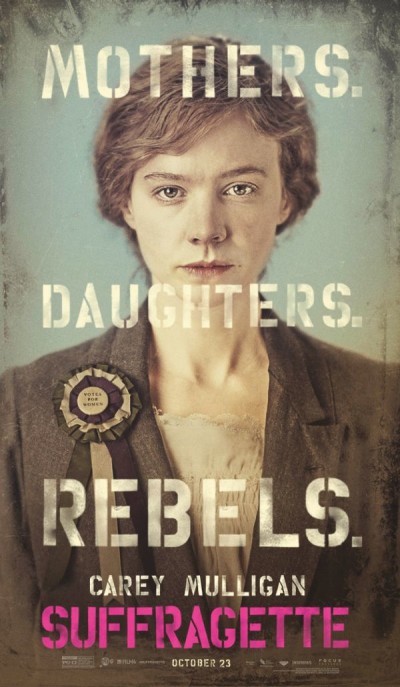★★★
“Worthy, rather than worthwhile”
 I generally find that films based on historical events, which also feel the need to make up entirely fictional characters, occupy a bit of an awkward middle-ground, as if they want both to be documentary and drama. Such is the case here, with a somewhat clumsy combination of people who actually existed, such as suffragette leader Emmeline Pankhurst and Emily Davison, who was fatally injured in a protest at the 1913 Derby, with an entirely made-up heroine, Maud Watts (Mulligan). She works in an East End laundry, but become part of the burgeoning movement to win women the vote, after her trip to the House of Parliament, in support of a colleague testifying there, turns into Maud having to speak on behalf of her friend. As Maud’s commitment to the cause grows, she is jailed, her marriage breaks down and she loses custody of her son, but remains unwavering in her support. Indeed, she becomes more militant, alongside chemist Edith Ellyn (Bonham-Carter), with the group moving into more hardcore methods of protest.
I generally find that films based on historical events, which also feel the need to make up entirely fictional characters, occupy a bit of an awkward middle-ground, as if they want both to be documentary and drama. Such is the case here, with a somewhat clumsy combination of people who actually existed, such as suffragette leader Emmeline Pankhurst and Emily Davison, who was fatally injured in a protest at the 1913 Derby, with an entirely made-up heroine, Maud Watts (Mulligan). She works in an East End laundry, but become part of the burgeoning movement to win women the vote, after her trip to the House of Parliament, in support of a colleague testifying there, turns into Maud having to speak on behalf of her friend. As Maud’s commitment to the cause grows, she is jailed, her marriage breaks down and she loses custody of her son, but remains unwavering in her support. Indeed, she becomes more militant, alongside chemist Edith Ellyn (Bonham-Carter), with the group moving into more hardcore methods of protest.
I can’t argue with the performances here, which are, almost without exception, upper-tier stuff: Mulligan’s transition from laundry lady into crypto-terrorist is particularly well-handled, bringing the audience on the journey of enlightenment with her. The problems are more elsewhere. That this is based on history – and well-known history at that – means there is precisely zero tension here. We know they’re going to end up getting the vote – though it didn’t happen, on even the most limited terms, until after the Great War, years after the events depicted here. So scenes like the protest at Parliament, where David Lloyd-George announces there will be no change in the law, and Maud is arrested for the first time, have little or no impact. The script also borders on the misanthropic: between abusive husbands, an abusive boss and a police officer (Gleeson) devoted to bringing the movement down, there is literally not a sympathetic male character to be found here, except perhaps Edith’s husband, who is so bland and uninteresting, you’ll forget him entirely.
The film climaxes with the events of that Derby Day, and again, the impact is diluted since we know it’s going to end in Davison’s death (the question of how intentional or accidental it was remains unanswered; naturally, the film frames it as an act of heroic martyrdom). The movie ends in newsreel footage of the subsequent funeral, without giving Maud any particular closure, and she just happens to be nearby at the time, a fortunate observer to a pivotal moment in history. A few captions fill in the blanks, and everyone heads off for a nice cup of tea. For it’s all terribly British, mostly replacing righteous anger with polite indignation, and despite Mulligan and her crew acting their crinolines off, is only somewhat successful at capturing the passionate beliefs that I sense these women actually held.
Dir: Sarah Gavron
Star: Carey Mulligan, Helena Bonham Carter, Brendan Gleeson, Anne-Marie Duff




